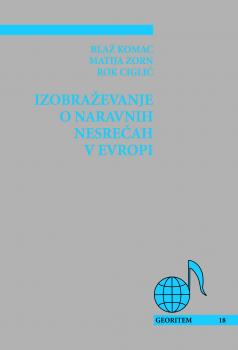Izobraževanje o naravnih nesrečah v Evropi
This volume presents the importance of natural-disaster education for social preparedness. Increasing damage caused by natural disasters around the globe draws attention to the fact that even developed societies must adapt to natural processes. Natural-disaster education is a component part of any education strategy for a sustainably oriented society.
In Slovenia, there is an increasingly urgent need for natural-disaster prevention and adaptation measures that would also take into account the characteristics of the society or an individual’s responsibility in addition to natural characteristics; education plays a vital role in this.
The purpose of this volume is to present the role of formal education in natural disasters in Europe. To ensure a uniform overview, the study used secondary-school geography textbooks from the collection at the Georg Eckert Institute for International Textbook Research in Braunschweig, Germany. Altogether, nearly 190 textbooks from 35 European countries were examined.
The greatest focus on natural disasters can be found in textbooks published in western Europe (3.8% of pages describing natural disasters), and the smallest in those published in eastern Europe (0.7%). A share of textbook pages exceeding three percent describing natural disasters can also be found in northern Europe (3.6%) and southeast Europe, including Turkey (3.4%). The shares in central and southern Europe exceed two percent (i.e., 2.8% and 2.3%, respectively). In Slovenia, geography textbooks dedicate above-average attention to natural disasters (i.e., over 4%). This volume presents the types and specific examples of natural disasters most commonly covered in textbooks as well as the type of natural disasters presented in textbooks according to the number of casualties and the damage caused.
The results show that the majority of European (secondary-school) education systems are poorly developed in terms of natural-disaster education. If education is perceived as part of natural-disaster management, greater attention should clearly be dedicated to this activity.
In addition to formal education, the volume also discusses informal education, raising a series of questions connected with the importance of this type of education. Special attention is drawn to the importance of knowledge that locals have about their region because this aspect of education is important in both traditional and modern societies.
Downloads

Series
License

This work is licensed under a Creative Commons Attribution-NonCommercial-NoDerivatives 4.0 International License.
